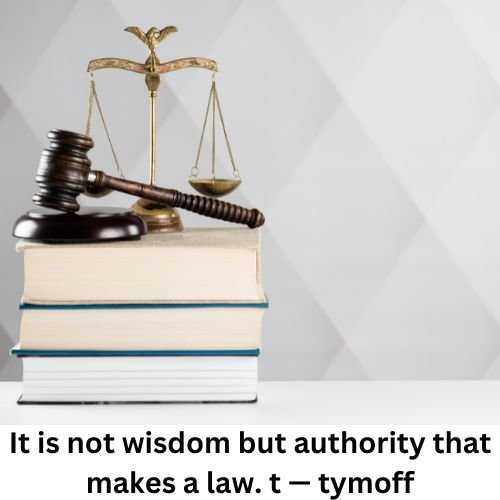
Tymoff’s saying, “It is not wisdom but authority that makes a law,” means that making a law doesn’t necessarily require wisdom; authority is what’s needed. It highlights the collaboration between authority and wisdom in legal systems. While authority establishes the rules, wisdom ensures the creation of fair and just laws.
In the intricate web of human interactions, wisdom and authority are crucial. They serve as fundamental components shaping societal norms. T. Tymoff’s quote It is not wisdom but authority that makes a law, which has spurred considerable debate, prompting a reevaluation of our perceptions of laws. It encourages us to reflect on the interplay between authority and wisdom, emphasizing their collective role in shaping the legal frameworks that govern societies.
What Does “It is not wisdom but authority that makes a law. t — tymoff” mean?
It is not wisdom but authority that makes a law. t — tymoff is a quote first used by Thomas Hobbes in his book “Leviathan,” published in 1651. It means that making a law doesn’t necessarily require wisdom; authority is always needed.
Wisdom Vs. Authority
Role of Wisdom
To understand the T. Tymoff quote It is not wisdom but authority that makes a law better; it’s important to grasp the difference between wisdom and authority. Wisdom is about using what you know in smart ways. If we talk about law and leadership, then wisdom and authority are the two elements that need to work together.
Wisdom in Law
In leadership and law, wisdom is key. Wisdom helps leaders and lawyers make good choices. It means being fair and understanding people’s feelings.
There is a belief that people have wisdom that only comes with age, but that’s not true. Anyone can become wise by learning, thinking, and growing throughout life. Being curious, open-minded, and content with not knowing everything is necessary for becoming wise. But authority is something else.
Role of Authority
Authority means having power or control over others. It’s about being able to make people think, act, or behave in certain ways, whether by convincing them, forcing them, or having the right to do so. Unlike wisdom, which comes from inside a person, authority comes from outside sources like official positions, knowledge, or what society expects.
Also Read: How I Sleep at Night Knowing I’m Failing All My cl – Tymoff
Authority in Law
Tymoff’s quote indicates that having authority allows you to create laws. You have the right, position, and power to establish new rules. However, wisdom alone isn’t always necessary for lawmaking. Governments and lawmakers make laws and have the power to make sure people follow them through law enforcement. Authorities make sure laws are followed and punish those who break them. This keeps society in order and stops things from getting chaotic. But sometimes, authorities go too far.
Authority alone can lead to the creation of unfair or oppressive laws without considering knowledge and fairness. Laws may not always serve the best interests of the people they govern when they are solely based on the whims of the powerful.
Synergy of Wisdom and Authority in Lawmaking
- Authority and wisdom need to work together to make good laws. If there’s too much focus on authority, laws might be unfair or harsh. But if we only focus on wisdom, people might not follow the laws, and society could get messy. It’s important to find a good balance between wisdom and authority.
- Today, in democracies and legal systems, both authority and wisdom are important. Elected leaders make laws based on what they think is best for the people, which is the wisdom of the society. Then, institutions like courts and police make sure these laws are followed using their authority.
Law and Need for Change
When we talk about making laws today, we’re talking about what’s fair and unfair. Laws aren’t just rules; they’re supposed to show what we all think is right and good. And as things change around us, our laws have to change too. They need to match what we believe is right now. This means that people in charge and those who understand what’s best have to work together to make sure our laws stay fair and make sense.
Also Read: A True Relationship is Two Imperfect People Refusi – Tymoff: Unconditional Love
Conclusion
Tymoff’s statement, “It’s not wisdom but authority that makes a law,” captures the intricate connection between these two factors in law. While authority sets up the rules, wisdom acts as the moral guide for creating fair laws. A good legal system finds a balance between these two, understanding that both are necessary for a society’s welfare.
Faqs It is not wisdom but authority that makes a law. t — tymoff
Who first said, “It is not wisdom but authority that makes a law”?
Thomas Hobbes, a philosopher from the 17th century, is often said to be the first to use this saying in his book “Leviathan.”
How can wisdom and authority be used in today’s laws?
In today’s laws, wisdom guides fair decisions, while authority ensures they are followed.
What are the consequences of ignoring wisdom when drafting laws?
Ignoring wisdom in lawmaking can lead to unjust regulations, stirring social unrest and discontent.








